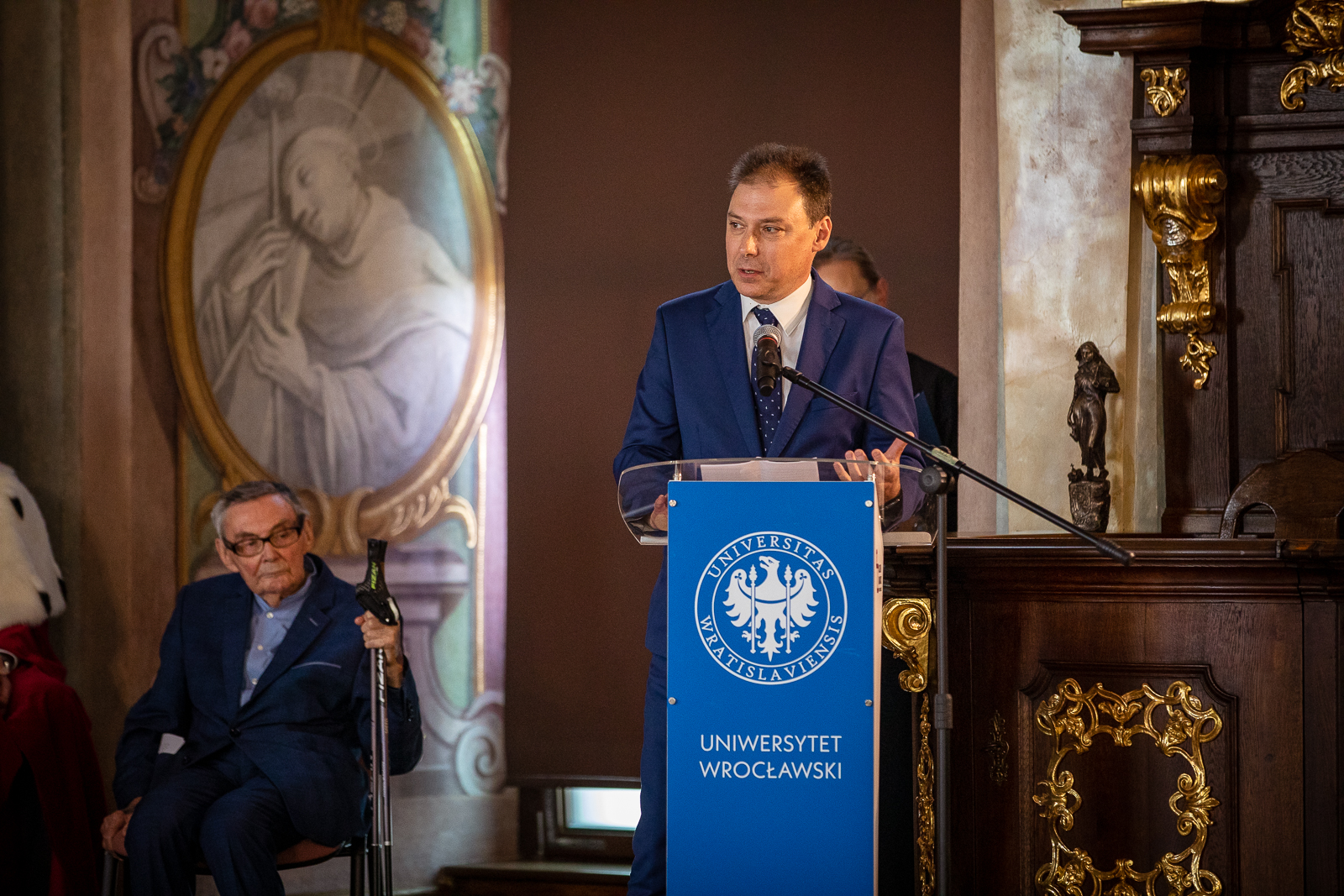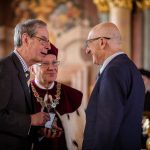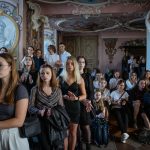
Gaudeamus igitur! [photo- and videorelation from the inauguration]
The ceremony of inauguration of 2023/2024 academic year at the University of Wrocław started on the 2nd of October 2023 with Gaude Mater Polonia performed by Gaudium choir.
When the rectors of Wrocław and Opole universities, members of the Senate, students, friends and employees of our University, distinguished guests took their seats in the Aula Leopoldina, the ceremony began, full of solemn and touching moments.
Among the honorary guests there were scholars nominated in the 2nd edition of the Heisig Prize for prominent and innovative scientific achievements: prof. Mariusz Jaskólski from the Adam Mickiewicz University in Poznań, prof. Tomasz Kapitaniak from the Łódź Technical University, prof. Lechosław Latos-Grażyński from the University of Wrocław, and representatives of the Founder of the Heisig Prize, Constantin von Kessel, the President of the Management Board of the Norbert and Barbara Heisig Foundation.
During the inauguration of the academic year, the Jadwiga Śląska Award was given. That is why Mr Marian Turski was present, who was awarded with it. As the Award was given to the Krzyżowa Foundation for Mutual Understanding in Europe, dr Annemarie Franke, the Vice-President of the Supervisory Board, and dr hab. Robert Żurek, the Managing Director of the Foundation, were honorary guests as well.
The inauguration speech was delivered by the Rector of the University of Wrocław, prof. Robert Olkiewicz. The Rector emphasised how important it is to search for the truth, to cultivate academic freedom in the area of research and teaching, respect for different views and human rights, to look into the future and for what is new, and to cultivate the tradition on the other hand.
– The Rector starting the inauguration of the academic year in toga is not just a custom based on tradition. It is something more – we show that we are faithful to the idea that guided the founders of universities. That is why I would like to emphasise that I firmly oppose any attempts to limit the freedom in search for the truth, the freedom of carrying out research and announcing its results, which are guaranteed by the Constitution. That cannot be limited. As an academic community, we proved that multiple times. It is said that freedom ends where the rights of others are being violated. How then can we refer to so-called freedom of speech in that context? I would like you to notice how important reliability in describing reality is. How valuable is a word based on attempts of getting to the heart of the truth, I have learned many times myself – said Rector Robert Olkiewicz.
During the ceremony, the Heisig Prize was given for the second time. Its initiator and founder is prof. Norbert Heisig, professor of medical sciences, honorary Senator and dr h.c. of the University of Wrocław, founder and long-term President of the German-Polish Society of the University of Wrocław.
In the second edition, the Office of the Heisig Prize, appointed by the Senate of the University of Wrocław composed of: prof. Beata Baczyńska, prof. Piotr Biler, prof. Elżbieta Gumienna-Kontecka, dr hab. Paweł Jałoszyński, and prof. Krzysztof Redlich, nominated three people to the Prize after getting acquainted with reviews and documentation of scholarly achievements of the nominated candidates:
- prof. Mariusz Jaskólski from the Adam Mickiewicz University in Poznań, representing chemical sciences and X-ray crystallography; he was nominated in recognition of structural research on proteins important for development of medicine, and for participating in enhancement of X-ray crystallography methods;
- prof. Tomasz Kapitaniak from the Łódź Technical University, who represented technical sciences, mechanics, and electronics; he was nominated in recognition of his research on chaotic behaviour of dynamical systems in engineering sciences models;
- prof. Lechosław Latos-Grażyński from the University of Wrocław, who represented chemical sciences, organic chemistry; he was nominated in recognition of his discovery of structural variability of porphyrins, which resulted in abundance of innovative structures with high research and application potential.
The Prize Committee, appointed by the Founder in composition of: Constantin von Kessel – the Chairman of the Management Board of the Foundation of Norbert and Barbara Heisig, prof. Robert Olkiewicz – the Rector of the University of Wrocław, prof. Zdzisław Latajka – the Rector of the University of Wrocław in 2002-2005, Jacek Sutryk – Mayor of Wrocław, and dr Maciej Łagiewski – the Director of the City Museum of Wrocław, chose the winner – the laureate of the 2nd edition of the Heisig Prize.
The prize was given by the Rector of the University of Wrocław, prof. Robert Olkiewicz, and by Mr Constantin von Kessel. Congratulations!
The Jadwiga Śląska Award
The Jadwiga Śląska Award is given every year since 2004. Its founders are the Mayor of Wrocław, the Rector of the University of Wrocław, and Salon Śląski.
The inspiration for granting the Prize is concern for respect for fundamental values beyond all differences and divisions, i.e. respect for human rights to live in peace, sincerity and friendship, concern for the European values, invaluable for all Nations. People and institutions awarded with the Prize have significant contribution to reconciliation and deepening of Polish-German co-operation or charitable activity.
This year, the Chapter appointed by the founders composed of: prof. Marek Bojarski, prof. Jan Harasimowicz, prof. Adam Jezierski, dr Łukasz Kamiński, prof. Zdzisław Latajka, prof. Andrzej Łoś, prof. Stanisław Rosik, gave the Prize to:
Mr Marian Turski – a historian, a journalist and a social activist; a human rights activist committed to consolidating the idea of the world without hatred; a person who has devoted his whole life to fight and reminding about human right to dignity
and
the Krzyżowa Foundation for Mutual Understanding in Europe, which was established in a process of Polish-German reconciliation in order to support European understanding; its objective is to support peaceful and tolerant co-existence of nations, social groups and individuals in Europe.
The awards were given by Mrs Maria Dorywała from Salon Śląski, Mr Jacek Ossowski, a representative of the Mayor of Wrocław and the Secretary of the Council for Higher Education and Science at the President of Wrocław (Rada ds. Szkolnictwa Wyższego i Nauki przy Prezydencie Wrocławia), and prof. Robert Olkiewicz, the Rector of the University of Wrocław.
Mr Marian Turski delivered a very moving and thought provoking speech to those gathered in Aula Leopoldina and appalled: – Don’t be indifferent!
He mentioned Wrocław from the times of his studies at university and his first love as well. – In Aula Leopoldina, 75 years ago, I won an oratorical competition.
Guests at the inauguration
Many distinguished guests accepted the invitation for the ceremony of inauguration of the academic year. Apart from representatives of state and local government authorities (the Vice-Voivode Bogusław Szpytma, the Starost of the Wrocław Poviat Roman Potocki, the President of the City Council of Wrocław Sergiusz Kmiecik, the Lower Silesian Superintendent of Education Roman Kowalczyk, representatives of diplomacy (the Honorary Consul of the Republic of India, Mr Kartikey Johri, the Honorary Consul of the Republic of Italym Mrs Monika Kwiatosz, the Vice-Consul of Hungary, Mrs Noémi Nagy, the Honorary Consul of the Republic of Brazil, Mr Radosław Tadajewski, the Honorary Consul of the Republic of Austria, Mr Edward Wąsiewicz), representatives of churches (the Ordinary of the Wrocław-Koszalin Eparchy, His Excellence bishop Włodzimierz Juszczak, the Bishop of the Wrocław Diocese of the Evangelical Church of the Augsburg Confession in Poland, His Excellence bishop Waldemar Pytel, the representative of the Orthodox Diocese of Wrocław-Szczecin, father igumen Spirydon Kuziak), representatives of research and scientific institutions, and representatives of business were also present.
Among those invited there were also: Mrs Katarzyna Sobańska-Laskowska, the Local Representative of the Comissioner for Human Rights in Wrocław, prof. Dariusz Kaczorowski, the Director of the Institute of Low Temperature and Structure Research of the Polish Academy of Sciences, the representatives of the Ossoliński National Centre – the Director dr. Łukasz Kamiński and dr Marek Mutor, the Head of the Department of Historical Research Office of the Institute of National Remembrance, dr Grzegorz Waligóra, the President of the Wrocław Scientific Society and the Director of the Provincial Specialist Hospital in Wrocław – The Research and Development Center, prof. Wojciech Witkiewicz, the Director of the State Archive in Wrocław, dr Janusz Gołaszewski, the President of the Wrocław Circle of the Union of Ukrainians in Poland, Mr Ihor Salamon, the President of the Chairman of the Board of the Foundation of the Jan Nowak-Jeziorański College of Eastern Europe, Mr Laurynas Vaičiūnas, the Chancellor of the Loża Dolnośląska Business Centre Club, Mr Marek Woron.
A senator of the Republic of Poland, Mr Bogdan Zdrojewski, and a Member of the Sejm, Mr Grzegorz Schetyna, also participated in the ceremony. The Secretary of State at the Ministry of Education and Science, government plenipotentiary for the functioning of research institutes, Mr Wojciech Murdzek, spoke.
The matriculation
The ceremony of the inauguration of the academic year is the most important moment for those who are starting education at our university.
During this year’s recruitment, we admitted 8,063 people to the University of Wrocław for studies in Polish, 437 people for studies in English, and over 100 doctoral students.
The ceremony of the matriculation of new students was performed by the Vice-Rector for projects and international relations of the University of Wrocław, prof. Patrycja Matusz.
After the students took the oath: “By joining the academic community of the University of Wrocław, I solemnly vow to acquire knowledge and skills, to act in accordance with the law, tradition, and good academic customs, to take care of the good name of the University of Wrocław and of the student dignity,” the Vice-Rector for Research of the University of Wrocław, prof. Artur Błażejewski, matriculated a group of new doctoral students.
The Chairperson of the Student Self-Government of the University of Wrocław, Mr Arkadiusz Smugowski, wished them success.
The matriculation lecture
The invitation for our ceremony was accepted by prof. Jerzy Koch, a literature scholar, Dutch and German Studies expert by education, specialising in Afrikaans literature and language, Dutch and South African colonial literature, a writer and a translator from our Alma Mater.
Professor delivered an inauguration lecture entitled “On the pedagogy of fear, la gaya scienza, poetry and ignorance – a few words for young people at the beginning of the academic year.”
– The most important thing is that you become independent and critical thinking beings, analysing reality, that you distinguish truth from falsehood, news from fake news, real patriotism from only verbally declared patriotism – Jerzy Koch told the students.
At the end, our traditional Gaudeamus igitur song was sang!
On behalf of the authorities of the University of Wrocław, we send congratulations to all the honoured. We wish our academic community comprehensive development, many further outstanding achievements and satisfaction from work. We wish perseverance and systematicity in acquiring knowledge and realisation of goals, fulfilling life objectives and experiencing unforgettable moments at our university for all students!
Translated by Emilian Olsiewicz (student of English Studies at the University of Wrocław) as part of the translation practice.

















































